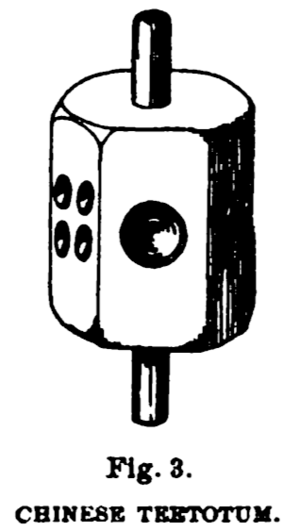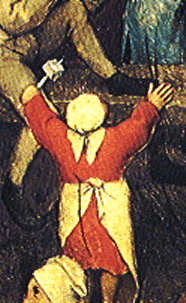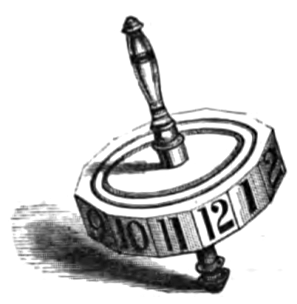Teetotum facts for kids
A teetotum is a special kind of spinning top. It has many flat sides, and each side has a letter or number on it. When you spin it, the side that lands face up tells you what happens in a game. People have used teetotums for games for a very long time!
What is a Teetotum?
Long ago, the first teetotums often had four sides. Each side had a special letter:
- A meant take (from the game's pot).
- D meant put down (add to the pot).
- N meant nothing (you do nothing).
- T meant take all (you get everything in the pot).
Other teetotums had different letters like P, H, or D (meaning half). Some even used Latin phrases like Nihil Habeas (nothing left) or Tibi Adfer (take all).
A writer named Joseph Strutt, born in 1749, remembered playing with teetotums when he was a boy. He said his teetotum had four sides with letters:
- T for take all.
- H for half (of the stake).
- N for nothing.
- P for put down (add to the stake).
Today, teetotums are still around! The dreidel, a Jewish game played during Hanukkah, is a type of teetotum. The Perinola is another similar game played in many Latin American countries.
Some modern teetotums have six or eight sides. They are often used in board games instead of dice. For example, the first version of The Game of Life from 1860 used a teetotum. This was because dice were sometimes linked to gambling, and the game wanted to avoid that.
Teetotums in Stories
Teetotums have appeared in many books and stories over the years.
In Rose in Bloom by Louisa May Alcott, a character learning to dance says, "A fellow must have some reward for making a teetotum of himself." This means spinning around a lot!
In Through the Looking-Glass by Lewis Carroll, Alice is asked if she is "a child, or a teetotum?" This happens when she moves around a shop in a dizzy way.
In Charles Dickens' Our Mutual Friend, some strange wooden objects in a river are described as looking like "huge teetotums standing at rest in the water."
Put and Take Game
In the United Kingdom, a game similar to teetotum is called "put and take." It uses a six-sided die. The sides of the die say things like:
- "Put one" (add one to the pot).
- "Take one" (take one from the pot).
- "Put two" (add two to the pot).
- "Take two" (take two from the pot).
- "All put" (everyone adds to the pot).
- "Take all" (take everything from the pot).
This game is usually played for fun with small amounts of money, like pennies. It's not meant for serious gambling. It's a "zero-sum game," which means that whatever one player wins, another player loses, so the total amount of money stays the same.
See also
 In Spanish: Perinola para niños
In Spanish: Perinola para niños
 | Toni Morrison |
 | Barack Obama |
 | Martin Luther King Jr. |
 | Ralph Bunche |




